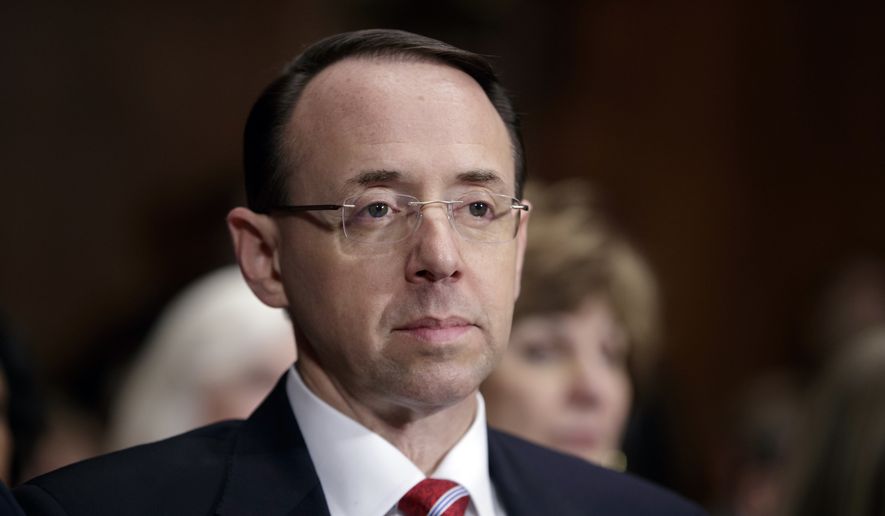Deputy Attorney General Rod Rosenstein told members of Congress he long had concerns with former FBI Director James B. Comey’s actions in the investigation of Hillary Clinton’s use of a private email server, but he only wrote the memo laying out his concerns about the director after learning President Trump intended to fire Mr. Comey.
The Justice Department on Friday released a copy the prepared opening statement Mr. Rosenstein gave to the Senate and the House as he briefed lawmakers on the firing and the decision to bring on a special counsel to handle the probe of Russia’s meddling in the 2016 presidential election and any connections to the Trump campaign.
“On May 8, I learned that President Trump intended to remove Director Comey and sought my advice and input. Notwithstanding my personal affection for Director Comey, I thought it was appropriate to seek a new leader,” Mr. Rosenstein said, according to the remarks.
When Mr. Trump announced the firing on May 9, the White House pointed to the memo written by Mr. Rosenstein to lay out the basis relied upon for the abrupt dismissal.
“I wrote it. I believe it. I stand by it,” Mr. Rosenstein told Congress.
In the memo, Mr. Rosenstein wrote that Mr. Comey was “wrong to usurp” then-Attorney General Loretta E. Lynch’s authority when he took it upon himself to hold a press conference in July to announce that the FBI would not recommend criminal charges against Mrs. Clinton. He was further troubled by Mr. Comey’s decision to announce weeks before the presidential election that the bureau was reopening the investigation as a result of newly discovered emails that might be relevant to the case — which ended up not containing any relevant information.
In his remarks to Congress, Mr. Rosenstein called the series of missteps “profoundly wrong and unfair both to the Department of Justice and Secretary Clinton.”
Mr. Comey defended his actions in the case this month, telling Congress he viewed his options — speaking out or concealing the discovery of emails that could have been relevant to the investigation of Mrs. Clinton’s use of a private server as secretary of state — as a choice between “really bad and catastrophic.”
But Mr. Rosenstein said the series of public statements about the email investigation “departed from the proper role of the FBI Director and damaged public confidence in the bureau and the department.” He said the issue of seeking new leadership at the FBI came up in one of his first meetings with Jeff Sessions, before the now-attorney general was confirmed.
“Among the concerns that I recall were to restore the credibility of the FBI, respect the established authority of the Department of Justice, limit public statements and eliminate leaks,” Mr. Rosenstein said.
Though the memo was written after Mr. Trump made clear he intended to fire the FBI director, Mr. Rosenstein said he chose the issues to include in the document. Before the memo was finalized, he said several career DOJ attorneys reviewed it.
• Andrea Noble can be reached at anoble@washingtontimes.com.




Please read our comment policy before commenting.